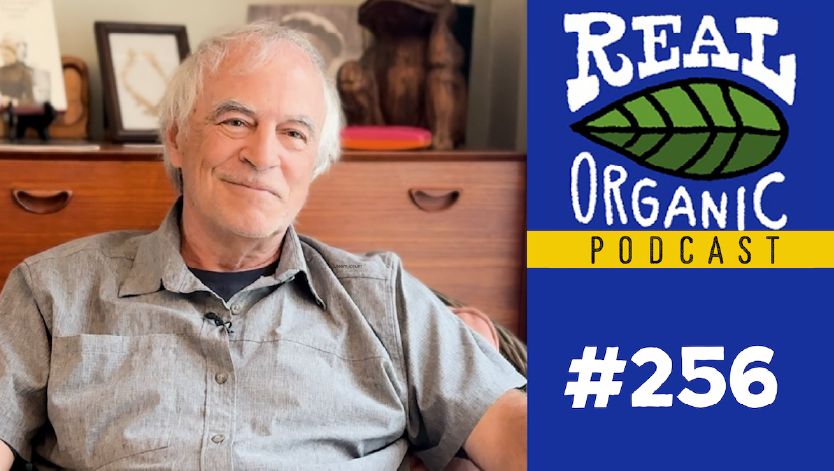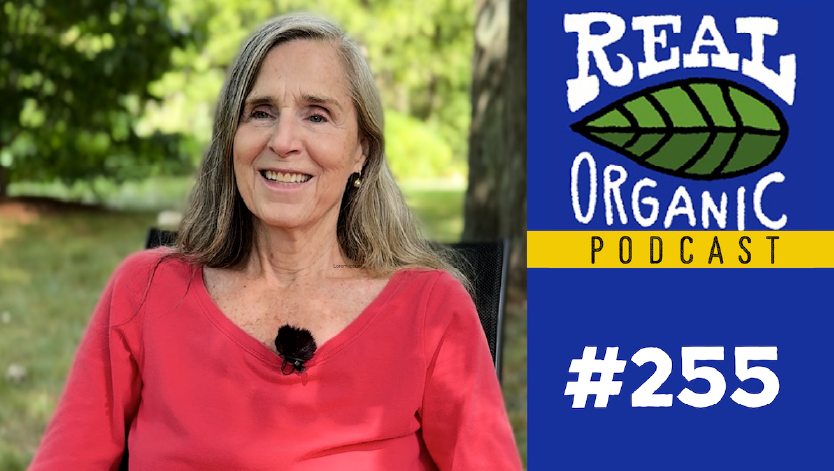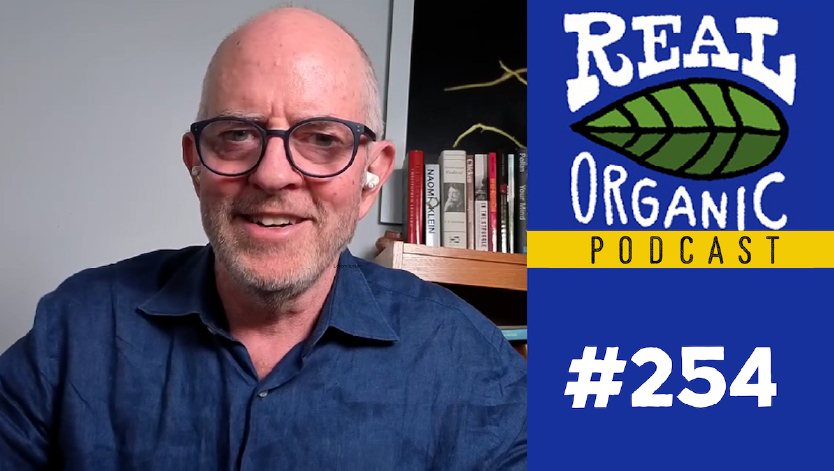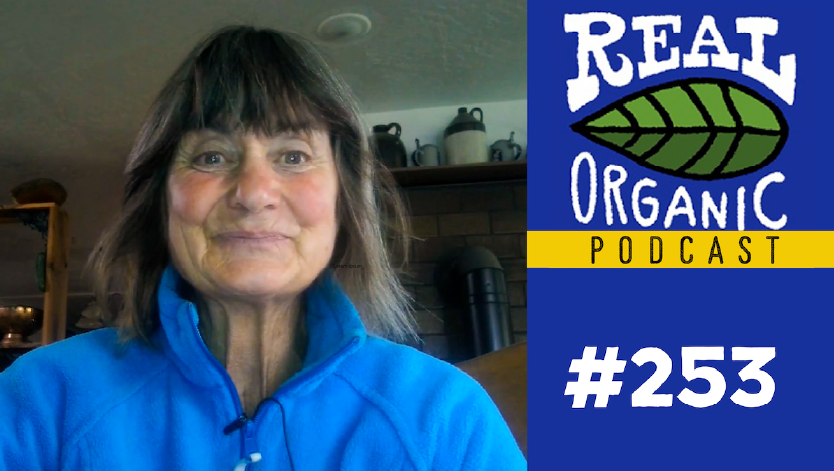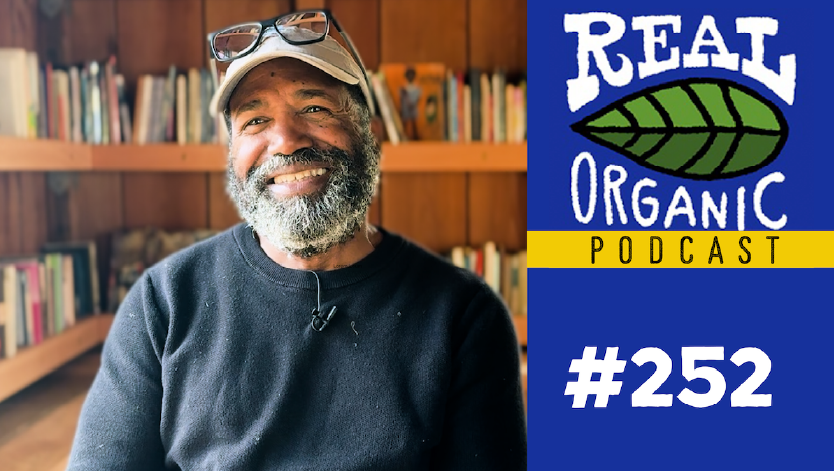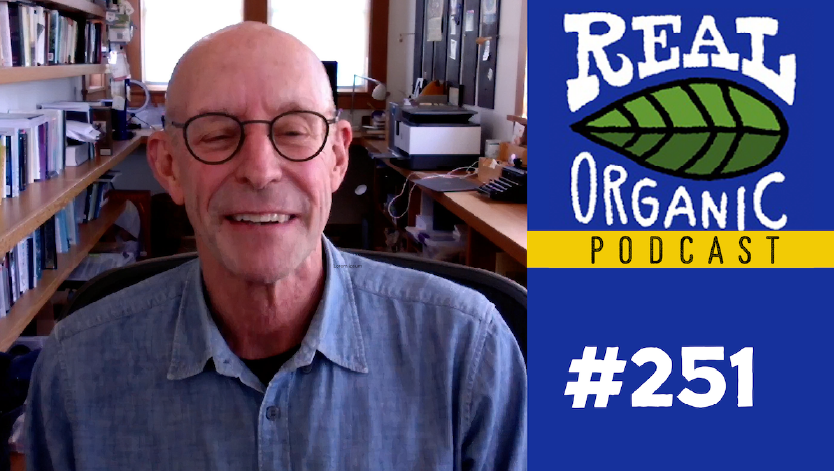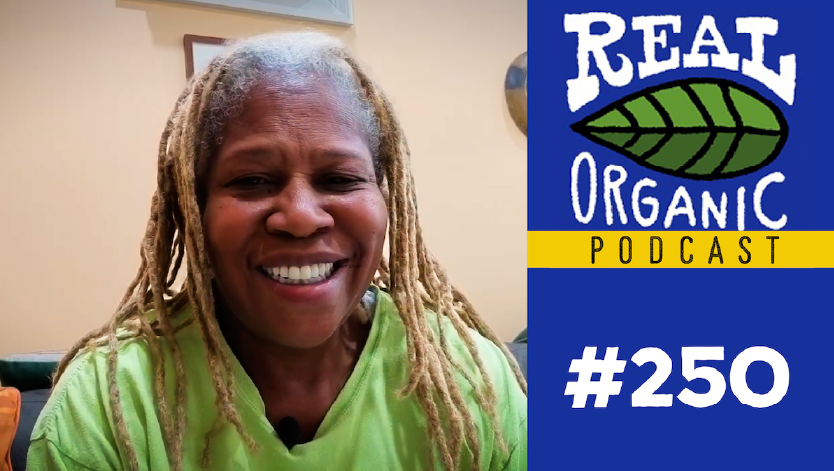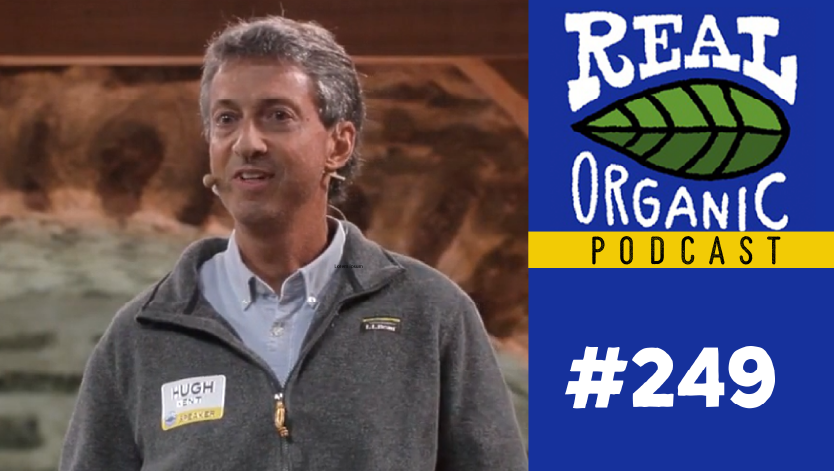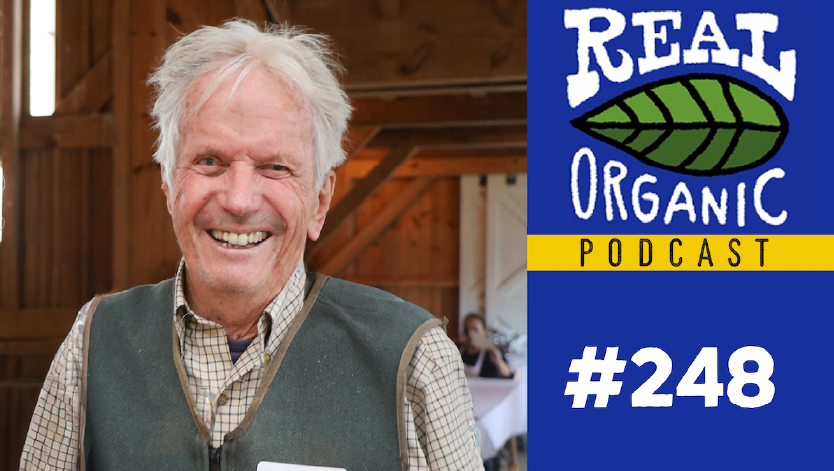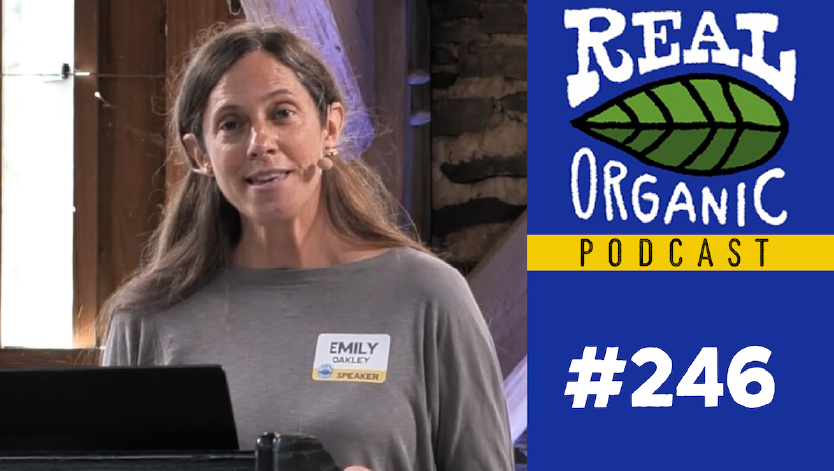Episode #247
“Eat Food”: The Amazing Work Of Joan Gussow
In this special tribute episode of the Real Organic Podcast, we honor the late Joan Gussow – the pioneering nutritionist, gardener, and teacher whose fierce intellect and uncompromising honesty shaped the modern food movement. Featuring reflections from Michael Pollan, Barbara Kingsolver, Alice Waters, Karen Washington, Pam Koch, Dan Barber, Eliot Colemnan, Chellie Pingree, and others, this conversation explores how Joan’s mentorship, research, and radical course “Nutritional Ecology” forever changed the way we will think about health, agriculture, and the natural world in the decades to come.
Our memorial tribute to Joan Gussow features multiple guests who were interviewed throughout the summer and fall of 2025. all have been edited and condensed for clarity:
You can subscribe and download episodes of our show through your favorite podcast app, our YouTube channel, or stream the audio-only version here:
Joan Gussow 0:00
Although we’ve escaped from the fields in the kitchen, we are totally trapped by the vision of food that has been created for us. We have no control over its production, we have no control over what’s available in the marketplace and we have no control over the sustainability of the food supply. We’ve learned to obsess over the consumption of food, and the food chain, in my view, is really going to hell.
Joan Gussow 0:21
I am trying to interest my colleagues in nutrition, in paying attention to agriculture. I would urge you to get your colleagues in agriculture to pay attention to consumers, because they’re the people who are the most important allies you can have. They have to be educated, not merely reassured, because otherwise I don’t think we’re going to have any kind of agriculture in the future, except one that is of the most high-tech sort controlled by a few industries.
I’m very interested in the whole food system, and I was interested in environmental issues before I ever went back to school. I went back to school with this interest in the relationship between the “Limits to Growth” notion of environmental constraints and food production. When were we going to run out of food, and what was going to be the limit, and so forth? Most of my work has been around those issues, looking at all the factors that affect the stability and the long-term viability of the food system.
Many years ago, a writer who was interviewing me for a story on obesity came to visit me in my garden on the west bank of the Hudson River. She brought with her a box of SnackWell’s. Remember those fat-free cookies that were the answer to obesity some years ago—less than a decade, actually? As we sat on the riverbank, my husband kept bringing up beautiful produce from the garden, including, as I remember, a spectacularly delicious red pepper. The writer had me try a SnackWell. I remember two things. I remember that it tasted something like artificial chocolate cotton, and I remember that shortly after I ate the first one, I thought I might have another one to kill the taste. There was this funny taste, and I thought that would help.
I was born in 1928. There were 800 items in the supermarket. There are now, what, 60,000 or 50,000? God didn’t make that many new foods in the interim, you know.
Dave Chapman 2:28
I want to talk to you about the significance of Joan Gusow’s work. When did you first encounter Joan?
Michael Pollan 2:39
It must have been in the late 80s. I think I met her at a Kellogg Foundation conference at the CIA, the Culinary Institute of America in New York. I knew of her by reputation, and I’d heard about her. I thought she was a pretty formidable figure, and a feisty one too.
Michael Pollan 3:08
But what I remember is I was writing about genetically modified crops for the New York Times, and I was writing mostly about Monsanto. She had stiffened my spine in various ways. We had a conversation about it, and she warned me that I’d get a lot of criticism from Monsanto and other people for writing about GMOs, but it was really important what I was doing.
Michael Pollan 3:38
I was young. I was very new. It was one of my first pieces on the food system. I think it was even before I wrote about organics. I found that it was one of those pep talks that are very helpful when you’re delving into a controversial topic. So, I think that was the first time having a meal with her at this conference, and my spine stiffened by Joan.
Dave Chapman 4:10
I’ve interviewed Joan twice, and I’ve written a number of letters about her, and I’m still just learning who she was and what her impact was.
Michael Pollan 4:22
She was not in the press as often as, say, Marion Nestle is, or a whole bunch of people in the food movement. I don’t know why that was exactly, but she wasn’t one of those people that the mainstream press wanted to quote. But everyone in the food movement knew her very well, and I agree, was strongly influenced by her.
Michael Pollan 4:44
She was one of these great dot connectors, in a way like Marion. Marion focuses more on political economy, although Joan Gussow was incredibly political and economically sophisticated. But her first love was nature, and she was a gardener, and I think gardening informed how she looked at the food system.
Michael Pollan 5:07
Gardening is a kind of a microcosm of the food system. She really had her hands and her feet in the garden all the time, literally, metaphorically, and philosophically.
Dave Chapman 5:24
One of the things in which she was fairly unique was in the world of people who would have described themselves as nutritionists, and I know that Joan eventually stopped describing herself as a nutritionist. She felt that that world was failing. But in that world, she’s the one, more than anybody I know, who connected nutrition to how the food was grown.
Michael Pollan 5:49
Oh yeah, and the importance of soil and the quality of food. She saw all these things as connected, that you couldn’t separate or really draw firm lines. What she rejected about nutrition was the scientific overconfidence, I think. She understood the limitations. I remember the first time I went to Piermont, to her house, I had been commissioned by the New York Times to write a piece.
Michael Pollan 6:25
After “Omnivore’s Dilemma” came out, they came to me and said, the question readers all have is, “What should we eat if we care about our health?” I was writing a piece that would become the “In Defense of Food: An Eater’s Manifesto” book. I went to her for advice, “Joan, what should we eat?” Her advice, she was able to reduce it to two words, “Eat food.” I was like, “Huh! Eat food. What do you mean?”
Michael Pollan 6:50
But in the end, that’s what I said. I elaborated a little bit, “Eat food, Not too much, Mostly plants.” But that basic blew the top of my head off, “Eat food,” because I’d been talking to people for whom it was so much more complicated, who were talking about nutrition, nutrients, polyphenols, antioxidants, fiber, and all these kinds of things. She just kind of said, “No, no. You just have to eat real food and you’ll be fine.” She could cut through a lot of bullshit with a very sharp knife.
Dave Chapman 7:37
Welcome to the Real Organic Podcast. I’m feeling privileged to be talking with Karen Washington today. Karen, thank you so much for doing this. We’re talking about your work, and about Joan Gussow and your friendship with Joan. How did all that happen?
Karen Washington 7:59
I met Joan while we were on the board of Just Food at the time, and really didn’t know how, in terms of being a celebrity she was, because she was really, really down to earth. She gave a lot of wisdom, and knew a lot about the food system.
Karen Washington 8:18
I was just a neophyte at the time, and just hearing her navigate what was happening in real time around the food system intrigued me. I talked about, in her own backyard, how she was growing food and how her relationship to land and food was so important to her. As I started my journey in the food world, I would talk to her about some advice.
Karen Washington 8:51
One day she said, “Karen, I want you to come and visit me, but I don’t want you to come alone. I want you to come and bring your community gardeners.” At that time, I was telling her how community gardening was, especially in low-income neighborhoods, and neighbors of color often don’t get a chance to go outside their comfort zone.
Karen Washington 9:14
So, she said, “Karen, I want you and your gardeners to come for lunch.” Most of my gardeners did not speak English at all and mostly spoke Spanish, but I was able to convey to them that we were going on a trip to visit a friend.
Karen Washington 9:32
She was incredibly nice. She was just so warm. She made everyone feel so comfortable. We left with so much joy and love. Right then and there, I knew she was going to be a friend for life. You know what hurts too, Dave, is that when I had heard that she was doing well, I had gone to a lot of her friends in particular.
Karen Washington 10:00
I said, like, to Mark Bittman, “You know what? Let’s all get together and surprise Joan.” I think it was one of her birthdays, and celebrate, because you never know what will happen. I regret that that didn’t happen. I really, really regret that didn’t happen.
Karen Washington 10:18
Something like that, you gotta live with. But I do cherish the fact that I knew her. I called her my friend. She called me her friend, and the loss was felt. The loss was felt among so many people that she touched. She will be greatly missed. What I have to do is make sure that I stand up, I’m direct, and I carry on that fire that she had.
Dave Chapman 10:56
As the elders die, the next generation becomes the elders, with all the opportunities and responsibilities.
Karen Washington 11:05
True.
Dave Chapman 11:08
She stayed a long time.
Karen Washington 11:11
She did, but she had work to do, and then when the work was done, it was like, “Okay, I’ve done the best I could, and I left an imprint on a lot of people to carry on the work.” So, we take a little bit from what she gave us and go with it. I’m pretty sure her students, the people that she met, she gave a little bit of herself to all of us. The bottom line is to stand up and fight for truth.
Barbara Kingsolver 11:41
She did not harbor fools, and she did not put up with delusion, or putting lipstick on any pig. She was really very – some people would say – blunt. That was just her wiring and her personality. She was very straightforward. I loved that about her. In a culture that so often deals in evasion, with people you don’t really know where you stand, you just knew where you stood with Joan. She said what she thought was true, regardless of how it was going to land.
Barbara Kingsolver 12:22
So, I just always think about that, and that was inspiring to me to be more like that – to be more direct. I was raised southern. I’m always going to be sweet. But she was instructive to me in how to be honest with people and to be a truth teller. It’s something that our culture needs.
Dave Chapman 12:45
I’m very pleased to be talking with Barbara Kingsolver today. It’s an honor to be talking to you. I just listened to “Animal, Vegetable, Miracle: A Year of Food Life,” which had your voice reading the part, and I appreciated that. You did a great job.
Barbara Kingsolver 13:04
Thank you. My daughter and my husband read their parts.
Dave Chapman 13:07
And your daughter and your husband. I love them being in it too, seriously.
Barbara Kingsolver 13:12
It was a family project, and we went into the studio as a family. I always record my own audiobooks, so I thought they should do the same.
Dave Chapman 13:21
Yeah, absolutely.
Barbara Kingsolver 13:22
Yeah. Even my novels, I do myself. I like going into the studio. To talk about Joan will be emotional for me, but I wanted to do this because I’m really sad I didn’t get to say goodbye properly to Joan. The last time I was with her, we didn’t know it was the last time we would be together.
Barbara Kingsolver 13:43
Of course, I talked with her after that by phone, but I didn’t get to really say goodbye. So, thank you for inviting me to do this for her. I couldn’t go to a memorial because I live a long way away. For me, this is some closure that I appreciate.
Dave Chapman 14:03
Yeah, absolutely. I did go to the memorial down at Columbia, and it was beautiful. There were all these women who had studied with Joan in the room. Some were my age, which is 20 years younger than Joan, and some were 20 years old. It was wonderful. How did you get to know Joan? How did that happen?
Barbara Kingsolver 14:28
I don’t even know why, but Chelsea Green sent me a galley of “This Organic Life: Confessions of a Suburban Homesteader” that must have been in 2000. I’m not an academic, so I wasn’t familiar with her academic writing. I wasn’t in that field at all. I was a novelist who grew up on a farm and live on a farm now, and I have been engaged with gardening and agriculture my whole life. I don’t know why they thought to do this, but Chelsea Green sent me a galley.
Barbara Kingsolver 15:08
I read the book, and I was so moved that I wrote Jon a letter, and she wrote back, and we became immediately very close. Jon was like a mother to me. She really was, and I know that people who know her might laugh about that, because she wasn’t a real teddy bear kind of person, but she got me in a way that no, you know, no parent ever had
Barbara Kingsolver 15:38
As it happens, she was exactly the same age as my parents, and yet there was no generational divide between us in the way that we conceived of, I want to call it, right livelihood. For me, gardening isn’t just a hobby. Writing isn’t just a job, and protecting the environment isn’t just something I do on weekends.
Barbara Kingsolver 16:14
All of those things are one for me. It’s a spiritual construct for me. I can feel her smirking at the word “spiritual,” but I know she felt it the same way. It’s how you go to bed at night feeling at peace with yourself. I know that she shared that.
Dave Chapman 16:42
I really like what you’re saying about these different parts of your life fitting together in a way that they’re almost equally important in different ways.
Barbara Kingsolver 16:55
And integrated – they’re not separate. That’s the thing. Work life, farm work, food work, literary work, and environmental work are all the same. The fact that she made that her life is something that I admire immensely.
Chellie Pingree 17:18
I’ve been so involved in Congress on the Food is Medicine idea, and getting more of my colleagues to be involved in that, and to understand how fundamental how you grow things is to the nutritional quality of it.
Chellie Pingree 17:31
Those are things she was talking about, but also tying people to this idea that you can work on policy – nutrition policy, ag policy – but having your own garden, knowing exactly how plants grow, growing some of your own food, is not only just fulfilling but also an important connection to make.
Chellie Pingree 17:49
She did that with so many of her students. That’s always been a big part of my life, and a real benefit to me to have been a gardener and a farmer, and also a policymaker, and understanding that you need to know a little bit about both. She was a great model for that.
Chellie Pingree 18:04
I found the testimony from her hearing before the Senate on the nutritional content and advertising for breakfast cereals. I can remember, on the Ag Committee several years ago, being in a nutrition hearing and fighting with my Republican colleague about why we should be more careful about how we advertise certain products to kids, and realizing that this goes back to 1972 and just looking at some of her testimony and how clear-eyed she was…
Joan Gussow 18:34
In 1977, to be exact, I was asked by the environmental organization Friends of the Earth to write a sort of manifesto about food, nutrition, and agriculture as a chapter for a book that was going to be called “Progress as If Survival Mattered: A Handbook for a Conserver Society.” We were already worrying about it, except we never did anything about it. This volume was to be placed on the desk of every incoming representative and senator on the first day of the next legislative session, in the really naive hope that it might cause thinking in Congress. It was, of course, a completely unrealistic assignment, so I accepted it. My conclusion was that the present global food system was environmentally unsustainable, and around the world, humans were destroying, mostly unknowingly, the basis of their own survival.
Marion Nestle 19:21
What Joan Gussow, in her work, always talked about was connecting the agricultural system to the health and nutrition system as part of one unit. That’s food systems thinking. People who are concerned about food systems thinking argue, as I would, that you can’t talk about the nutritional status of people without understanding how the food is produced. The production system is designed for profit; it was never designed for public health. I think we need an agricultural system that has, as its fundamental purpose, improving the health of people.
Eliot Coleman 20:05
I have behind me here – if it’s where it should be – “The Feeding Web: Issues in Nutritional Ecology.” This is a book she put out a long time ago, and that’s basically what she was talking about. But, oh yeah, the stuff in here is so good. Long before anybody from academia was willing to say nice things about organic as a method of agriculture, not just organic food, Joan was saying it.
Joan Gussow 20:52
One of the reasons that I started growing all my own vegetables was that 25 years ago, I came to the conclusion that agriculture was in so much trouble, and the only way we could change it was to get the average person to know something about agriculture. The only way we could do that was for people to know farmers. They had to be in touch with farmers so they could understand what was going on. I thought the only way they could be in touch with farmers was if farmers were fairly close to where they lived. The only way farmers could be fairly close to where they lived was if people would buy what the farmer produced seasonally. So, we have to promote seasonal diets. We have to reintegrate ourselves into the natural world, which is what real organic, at its best, does.
Alice Waters 21:43
The real connection came around organic. She was so obsessed with that I didn’t really know deeply what that meant. I’m not a farmer, I learned from her how important that was, and now it’s in every conversation I have, everywhere I go.
Speaker 1 22:16
Welcome to the Real Organic podcast. I am talking to my friend Alice Waters today. Alice, thank you. I counted, and I think that we’ve recorded conversations seven times over the years. I was amazed. I was like, “Oh my goodness.” There was the time you came to our symposium, and we had it live there, and we’ve done different interviews.
Dave Chapman 22:39
You encountered Joan primarily through speaking at events together, or when you went to hear her speak. Tell me about that.
Alice Waters 22:49
Both. Hearing her speak, but also hearing all my mentors speak about her. I did go to see her when she had her garden in New York State.
Speaker 1 23:06
Famously, Joan said that her educational course, Nutritional Ecology, was about everything that happens before the swallow. This is by someone who was the head of the Nutrition Department at Teachers College, Columbia University. It was very radical at the time for Joan to start saying, “We need to study everything that happens before you swallow the food.”
Dave Chapman 23:39
This was a course on nutrition, but it was so much bigger than that. You are a very notable chef. Your work was also about talking about what happened before the swallow, as well as what happened after the swallow, right?
Dave Chapman 24:02
You said, “Well, this is going to be a delicious revolution.” So, it’s going to taste good when you swallow, and it’s going to be good for you. But tell me about your concern about what happens before the swallow.
Alice Waters 24:17
That’s the most important thing, from my point of view, is where the food comes from. How is it grown? How is it taken care of, and how far did it travel to get to where you’re putting it on the table? I discovered so much about the disrespect for farmers who were taking care of the land. Joan was the first person who validated for me the word “organic.”
Dave Chapman 25:05
I’m happy to be talking with Pam Koch today. Pam, hello. You have picked up Joan’s mantle at Columbia, teaching this amazing course or courses that she developed. I loved the story of the first time that she started Nutritional Ecology, which I think was her truly famous course. Her husband said to her, “Joan, you don’t know enough to teach that.” She said, “I know. I don’t, but nobody else does either, so I have to do it.”
Pam Koch 25:42
she said she was trying to figure out how to put all of these pieces of the food system together because no one had taught it. She started out by clipping articles that she thought in one way or another related to the food system, and filing them and trying to figure out what seemed to go together and what made sense. She always talked about that.
Pam Koch 26:08
It wasn’t until we were cleaning out her house that I actually found one of those marble composition boxes, that are little file boxes, that she had. They were full of articles from the 1970s that I think were her original attempts at trying to put together the pieces of this course.
Dave Chapman 26:29
oan, somewhere towards the end of her career, said that she no longer identified herself as a nutritionist. I assume you heard that.
Pam Koch 26:40
Yes.
Dave Chapman 26:42
What do you think that she meant by that? Why did she say that?
Pam Koch 26:45
It’s really ironic. If we had said, “Okay, we want our food supply to have the foods that we now know from nutrition science nourish us,” we would have a different food supply. I think why Joan thought that she didn’t see that anymore is because she started to see we don’t need any more reductionistic nutrition research.
Pam Koch 27:11
What we need is to understand how people think about food and what makes it possible for people to change their eating behaviors, almost despite the challenging food supply. That’s the area that I do research in, and it gets a lot less research attention and dollars. So, I think that’s why she didn’t see herself as a nutritionist anymore, because that’s where the field was going, primarily.
Dave Chapman 27:40
You said something about our understanding of what nutritious food is. It is changing. We used to just look at a list of vitamins and say, “Does it have these vitamins?” Then we kind of jumped into Ultra processing, which, that’s a whole other horrible thing. But if we stayed with basic food stuffs for a minute, and potatoes and carrots, and try to understand, is there a reason that I should support this carrot instead of this carrot? Is there…?
Joan Gussow 28:14
I think so. I was once asked to give a talk about the comparative nutritional value of organic, and I couldn’t even find any studies. There was very, very little that had ever been done, because it’s expensive to do that kind of research. The organic people aren’t going to do it, and the conventional people aren’t going to do it. What are they going to do, compare organic with theirs and find out that theirs is worse? They don’t want to do that, so there’s not very much research out there, and a lot of what’s out there is not true anyway. There was one study that was talked about all over the place, about somebody going to a grocery store and buying organic and non-organic and comparing them. You don’t know anything about that. That’s not a controlled study at all. You can’t do that. Basically, we haven’t really known. I think the recognition that there’s obviously more in organic has come from this research about what’s going on in the soil and how what’s in the soil affects what’s in the food, and what’s in the soil in organic is very different. Much more life is in the soil in organic growing than in conventional growing. That makes a difference in what’s in the plants, and that difference is not expressed in vitamins. In other words, you may have an equivalent amount of vitamins in the two foods, and then you’ll say, “So there’s no difference?” Well, there’s a whole bunch of other stuff that you’re not paying any attention to.
Dave Chapman 29:55
Yeah. One of the things that’s been suggested to me is… The last I heard was that there were 40,000 secondary plant metabolites that we have identified, and far more that we haven’t identified, and that all of those substances have some impact, but we don’t know what, and we don’t understand the relationship.
Joan Gussow 30:21
There are people who will now argue that you can’t talk about something having more beta-carotene as better, because we don’t know how much beta-carotene you should have. So, what difference does it make if it’s a different amount? We have RDAs for a certain number of substances, Recommended Dietary Allowances, but we don’t have those for beta-carotene or any of the carotenes. Why do we pick beta-carotene? There are all these carotenoids. There are all these substances in plants that, who knows what they’re doing, but they’re doing something.
Pam Koch 31:06
The other really important thing about Joan is she was always saying, “Is that the right question?”
Dave Chapman 31:14
What do you think Joan might have thought the right question was?
Pam Koch 31:17
I think she would say, “The right question is, what is it doing for the health of the planet and the health of the soil, and then believe that that is going to transfer onto human health.”
Pam Koch 31:31
I think she would say, “We are connected to the ecosystem around us, and our ecosystem is in trouble.” Our water, air, and atmosphere are in trouble. That doesn’t only relate to how we’re producing food, but it can be helped by how we produce our food, and also it is affecting our food production, because we’re producing food in that world.
Pam Koch 32:02
But I think she would say, “If we want both people and the planet to be healthy, the best path to do that is for everyone to be eating real organic food, and to be making it so that real organic food is actually increasing in its availability in our food supply, and that we are actively working on having policies and programs that are helping that to happen.”
Dave Chapman 32:36
Can you tell people about what that does Nutritional Ecology mean? When I talked to Joan about it, I thought, “Oh, my God. Are you recording all this? Because I want to take this course, and that means a lot of people want to take it.” What does that mean?
Pam Koch 32:53
It is really the connection of how what we eat affects the environment around us. That’s, I think, the broadest definition. The course takes a really broad approach. If we had to say what kind of course it is, it’s more of a survey course, which means we are looking at a lot of topics, and therefore we can’t look at any one topic in great depth.
Pam Koch 33:20
Joan started teaching the course in the early 1970s. There’s a book that came out that you’ve probably heard of, called “The Limits to Growth,” that was by Dennis Meadows, Donella Meadows, and others. That came out right around the same time that Joan was starting to teach this course.
Pam Koch 33:42
What that book really said was we are really going to reach the limits of our planet’s capacity – this was in 1972 – within the next 50 to 100 years. Now it’s 50 years later, and very interestingly, to fast forward for a second, we have been following what they predicted would happen. They predicted that by 2020, so 50 years after they wrote the book, we would be starting to see the limits to the system, which is what we are seeing.
Pam Koch 34:20
The course still starts with a session that is, “Are we reaching the limits to our planet’s capacity?” Then it goes on to think about whether or not we have a problem with producing enough food or overpopulation, to understanding how we use energy to produce our food, to many sessions that are on agriculture that touch on basically what is the history of agriculture in the United States, but also around the world.
Pam Koch 34:52
Of course, there’s a session on organic, biotechnology, on the true costs of food, and then we end with sessions that take it very local, a session on local, and then one that takes it more global on trade and development, and how that relates to food.
Pam Koch 35:11
It really has been described by our students for generations as transformative, because they are thinking about topics and issues that they have never thought about before, and so it opens up a new world to the students who take it.
Olivia Hasse 35:29
The course was pretty life-changing, I would say. I remember when I first started my career out of college, I was doing something very different, and I had this idea of what health was, and it was motivating me to go to grad school. I entered Teachers College with this idea.
Olivia Hasse 35:51
We buy the food, we eat the food, and then that determines what happens next. But Joan’s course encouraged us to think so much bigger than that, broader than that, and that’s really where my idea and understanding changed. Health is not just determined by what happens once you eat something; it is about what happens way before that.
Speaker 1 36:23
I’m talking today with Olivia Hasse. Olivia, we met when you were helping your husband, partner, and his father host a dinner for the Real Organic Project at Long Wind Farm.
Olivia Hasse 36:45
I was lucky enough to be one of Joan’s students at Teachers College, Columbia University, about five years ago, during her last two years of teaching. I really feel lucky to be able to say that I was her student, because she was 92 when she was teaching.
Olivia Hasse 37:04
She encouraged us to think so much bigger than this idea that we all had about health, nutrition, the food system, and the world. She was critical and direct. She challenged us to think a lot bigger through those conversations. She was really living her values out loud. She believed all these things, and she was helping us to believe these things, but then she was showing us how she was doing them in her life. She brought us to her home in Piermont, and we got to see her garden and the way she was living. We got to see where her community gardens were in her neighborhood. She was teaching us in the classroom, but she was also showing us what she believed in outside of the classroom.
Dave Chapman 37:56
How much was organic a part of the conversation? Certainly, I had that conversation with Joan. How much was it a part of her Nutritional Ecology course?
Olivia Hasse 38:08
it was certainly a theme throughout. Real Organic was also a theme throughout. I remember learning all about Real Organic, so it feels like a huge honor to be here talking to you years later.
Dave Chapman 38:21
What do you think Joan saw as the biggest solution or opportunity that made her most hopeful? What would that be that is moving us toward the system we want?
Olivia Hasse 38:36
I think in Joan’s ideal world, everyone would have access to a garden and be involved in growing. We would have the ability to choose what we eat that is healthy and makes us feel good. It would be from somewhere, maybe in our neighborhood or community. We wouldn’t be choosing foods that are not seasonal or that come from halfway around the world. I think those are some of the things that perpetuate the disconnect. So, I think one of the biggest solutions would be to have more access to healthy food.
Joan Gussow 39:26
Somebody came up to me last night and said, “You don’t remember me, do you?” She said, “But you changed my whole life.” People are always saying that to me. If people are presented with interesting and important material that has relevance to their lives, or somebody can make what they’re teaching relevant to their lives, then maybe they learn something because somebody has organized this body of material so that they see it in a different way. In a certain sense, the food industry has bought the profession. I worry a lot about all the toxins we’re throwing into the environment. I don’t know how long we can believe that we can poison the earth without poisoning ourselves. We’re really in a terrible mess. I think people are deeply upset when they’re finally brought to realize that it’s what they’re feeding their kids that’s doing it to them. I think people are getting more and more upset and want something better.
Dave Chapman 40:19
Can we talk about the evolution of where Stone Barns is going? So, Stone Barns is this – for people who don’t know it, whoever they might be, hard to believe – this amazing combination of a brilliant farm growing beautiful, real organic vegetables, meat, and grain, and a top-end restaurant, Blue Hill at Stone Barns, preparing it to be absolutely delicious.
Dan Barber 40:48
You just described the past 20 years, which we’re now celebrating. Now we’re in our 21st year, and we’re looking toward the next 20. So, what is the next 20? We’re sitting here after 20 years, Dave. What are we saying we’ve done? It’s less about the vectors pointing to the farm and to the restaurant and that relationship, which we call Farm to Table, which has so much to inspire, excite, and energize a generation around the direct connections between a farmer and eating.
Dan Barber 41:22
But how can we take those connections and that relationship and get it out of here? How can the vectors point out and democratize what we’re looking at and what we’re tasting? Because what we’re seeing over 20 years of work is that while most of these ideas have been celebrated through my menu and through Blue Hill, there is an opportunity to democratize flavor, nutrition, and farmer equity.
Dan Barber 41:51
What we are seeing is these ideas being incubated in a very privileged environment. Let’s call it what it is, Dave. This is very privileged. But we are finding that these ideas have legs. Buckwheat is not a privileged crop. Buckwheat is actually a poor-soil crop. Buckwheat is a magical rotation crop that’s not in the purview of a white-tablecloth restaurant charging $450 a person every night – which is what we do. But in fact, it’s really a miracle and should be in nearly every region around us anyway, in this environment.
Dan Barber 42:47
I think that’s the goal of the next 20 years for our work together. It’s not to have the vectors point at me or Blue Hill. It’s that the learning and the incubation of these ideas spread. Not scale – spread. That’s the key. I think you saw that around: “Don’t ask me how this scales; ask me how this spreads.” Because scaling is how we got into this mess. You know better than I do. We got into this mess because we drive to the lowest common denominator.
Dan Barber 42:47
That doesn’t mean that buckwheat grows in every region. It doesn’t mean that dairy should be practiced in every region. There are regional niches we should be exploiting in a good way – digging down, drilling into a regional context that is rich with… and every region is rich.
Dan Barber 43:27
You know what? That’s how I said it. I was just talking to someone the other day. They were investing in a Blue Zone thing – one of those Blue Zone deals. I’m just like, “Is it really like the Okinawan sweet potato is this magic? What? It’s like – this is a Blue Zone. Right here is a Blue Zone.” We just haven’t had the mindset for it yet. We don’t have the history, the community, and the ecological intelligence, as Wes Jackson might say, to exploit it for richness. That just seems like an opportunity waiting to happen. That’s what we’re doing here. We’re trying to take the niche and create a Blue Zone because we know we have it. Everyone has it.
Dave Chapman 44:10
As well as this kind of biological sophistication, we also need to build a social network, which is an important part of this.
Dan Barber 44:20
Nicely said. Although the organic dictate would be biological resilience. It’s connected to the social results. It has to be. That’s why organic is an organism. The whole thing. It’s not one part. We’ve obviously dumbed it down. But yes, you’re right. If you don’t have the market excitement, the food culture pulling this, then you could be the most exalted farmer in the world. But it stays in places that are elitist.
Dave Chapman 44:49
I’ve always been struck by the difference between Eliot Coleman and another wonderful farmer who has never spoken aloud about what he or she is doing. They have incredible food for their customers.
Dan Barber 45:04
Who’s that? Go ahead and name him.
Dan Barber 45:05
There are dozens of them. But Eliot was unusual in that he also has incredible food. Anyone who’s lucky enough to be a customer and go and eat there…
Dan Barber 45:16
He wrote a book too.
Dave Chapman 45:17
He wrote several books…
Dan Barber 45:17
I know. I’m writing the introduction for it right now. I’m trying to think of how to frame it, but I think he was able to articulate his ideas in a way that people could understand.
Speaker 1 45:30
In the book, in many speaking engagements and articles… My point is, Eliot had the skill set, the ability, and the temperament to be public about it. What he did became a model for many people. I’ve run into them all over the place. Eliot’s books changed my life.
Dan Barber 45:49
You’re running into them here. I’m a chef because of Eliot. You’re right.
Dave Chapman 45:53
That’s right. We owe the people who are able to do that. We don’t need to worship them; we need to appreciate that they did that and thank them, saying, “Thank you for being so loud about this.”
Dan Barber 46:08
Yes.
Dave Chapman 46:08
Joan Gussow, our dear friend, died this year. You’re speaking tomorrow, but I wonder if you’d speak right now. Not everybody knows who Joan was, of course. She really, really was significant in my mind. She was the first in many places to say it… I think it was Michael Pollan who said, “Every time I think I came up with a pretty good idea, Joan had already said it.”
Dan Barber 46:33
Joan I said it first. I couldn’t say that more strongly. For me, personally, what you just saw today – and I’m going to say, for those who didn’t understand where you were – you were a part of chefs and farmers showing and tasting for the outside world.
Pam Koch 46:52
The experiments that we’re doing furthers the environmental enrichment of this place and the farmer’s pocketbook by giving an economy, and the cooks by getting excited around an idea that’s important to farmers and creates a food culture around it for healthfulness.
Dan Barber 47:09
I think, as you saw, almost every table had a nutrition analysis of what we were doing. We’re bringing in a lot of sciences to get that, Stefan Van Vliet being one of them, but we wanted to prove that what we’re tasting is at the highest level, but also the nutrition follows. Dave, it has been the through line – always consistent, same.
Dan Barber 47:25
Now, what I just said, what you just looked at, is really an ode to Joan. That was her idea, and we said it earlier, and it’s worth repeating over and over: the correspondence between good food that’s good for you and grown in the right way and improves an environmental niche is truly healthy food.
Dan Barber 47:51
She was saying that in the 1970s. I feel like we are just waking up to that – but not yet – because, as you said, people are leaving that out of the definition. Joan’s wisdom – as much as I think, when I read these odes to Joan after she died – a lot of it was, “Joan was saying this thing for a long time,” and only now are people recognizing it, actually.
Dan Barber 48:15
I think Joan’s wisdom is going to become even more important, prevalent, and acknowledged 20 years from now. Here I am, back to our 20-year conversation from now. I think she will be looked back on the way we look back on Sir Albert Howard, actually. I really believe that. Sir Albert Howard wasn’t Sir Albert Howard till many, many years later.
Dan Barber 48:33
He’s sort of the godfather of organic. I think she’s going to be the godmother of this idea that organic food and nutrition have to be at the same nexus. It’s a very powerful idea. Intuitively, you could say, “Well, we already understand that,” but we don’t.
Dan Barber 48:52
We need a wholesale re-evaluation of what healthy food is, and it has to start with soil, and she nailed it. She was the best influence on me. By the way, she was the original consultant for this project. I don’t know if you knew that.
Dave Chapman 49:12
No, I didn’t.
Dan Barber 49:12
Her, Michael, and Eliot. She was part of the brilliant “fertile dozen,” we called them. What she said absolutely affected me greatly. I’m the beneficiary of that wisdom. As you can see, so are my cooks.
Dave Chapman 49:30
Yeah. So are we all.
Dave Chapman 49:33
Dan Barber felt that Joan’s impact was much greater than we realize, and that she would be much better known 20 years from now than she is today. Do you think that’s true?
Pam Koch 49:49
I’ll sometimes come across something that Joan wrote in 1983. I’ll pick it up and read it and say, “This is over 40 years old, but it is showing us what we need to do today.” I think we need to make sure that we keep her writing and her influence alive and well so that we can learn from her, because I do believe she was ahead of her time, and the world is catching up with her.
Barbara Kingsolver 50:20
Yeah, she was ahead of her time, but she was ahead of her time a half a century ago.
Pam Koch 50:26
I think she was happy that she lived long enough to see at least people talking about all of this more and recognizing the need to change more. I still think we have a long way to go to change and have a food supply that is nourishing everyone. But I think she was happy that she lived long enough to see the world starting to catch up to her.
Dave Chapman 50:47
Do you think that might be true, that her influence will grow over time?
Michael Pollan 50:53
Yeah, in ways that we shouldn’t be too thrilled about, because she was making predictions about how things were going to collapse if we didn’t fix it. If and when things do collapse, she will be perceived as prophetic. She really did talk about the strain that industrial agriculture was putting on the natural world. I don’t know if that’s what Dan had in mind, but when I think about her influence going forward, a lot of it was in the form of urgent warnings that we were on a really dangerous path.
Barbara Kingsolver 51:34
When I look at her career, and at the truth teller that she was, and the blowback that she got, I think of Rachel Carson. I think that Joan was positioned in a very similar way, in a field where women were not going to be respected, particularly if they were calling out the big boys.
Barbara Kingsolver 51:56
So, I’m happy that Joan’s trajectory was longer than Rachel Carson’s, that Joan got to live to see a lot of the world getting on board with the things she was trying to bring our attention to, and that she really got to literally enjoy the fruits of her long life.
Michael Pollan 52:27
I just miss her. I miss her voice. I still hear her voice, and she could be a scold too. As I said, she was very feisty and very opinionated and did not soften her message. She was very direct. She didn’t like everything I wrote, and she would tell me when she didn’t. But I just found her voice really encouraging to me. I felt like when you had Joan’s support for something, it meant something. It meant you were on the right track.
Barbara Kingsolver 53:11
I feel like she’s with me all the time. I gave her a tree – we gave each other interesting gifts. I gave her a trifoliate orange tree. It’s the only hearty citrus. I knew she loved making that marmalade, so I gave her a trifoliate orange, which she planted in her garden. I was so happy every time I visited to see it had gotten bigger and bigger.
Barbara Kingsolver 53:39
Then when she had these disasters and had to completely remove, build up, and restore her garden because of climate change in the Hudson River, every time I thought that tree was going to go – because it was taking up very valuable real estate and she might need more blue potatoes or something – but every time I went to see her, it was still there. I just think of that tree when I think of Joan, because that’s the grit she had that we need to keep with us.
Barbara Kingsolver 54:16
Sometimes you have to completely uproot – completely redirect. Sometimes you feel like the whole bottom has dropped out of your world, your garden, your political system, or whatever, but we can still go. We can still dig in with our roots and keep going.
Karen Washington 54:36
What would Joan do? Oh, I could hear her now. Under these circumstances, she would not hold back.
Joan Gussow 54:54
Am I an optimist? I have to be. What am I going to do? I’m not going to be here to see it happen anyway. I just have to hope for the rest of you that it changes. I’m not going to be around forever.


